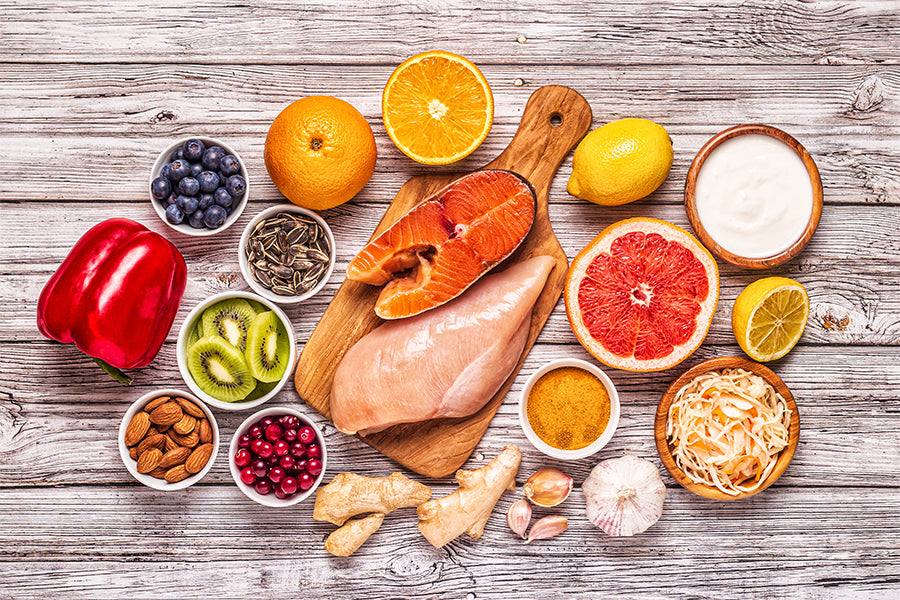Have you been feeling out of sorts lately? Are your energy levels low, and do you constantly feel demotivated? These can be signs that something in the diet needs adjusting.
As we age, our bodies produce less testosterone than they did when younger - an unfortunate side effect for those who want to remain active into their later years! Luckily there are many ways to get around this problem, including eating balanced meals containing nutrients that boost Testosterone hormone production.
Testosterone is a hormone produced in both males and females. There are two main differences between testosterone in males and females: it's produced in different parts of the body and in greater amounts in males than in females.
Testosterone hormones are essential for regulating many important bodily functions in men and women. Testosterone is responsible for developing secondary sex characteristics such as facial hair and a deep voice in men. It also regulates libido, bone density, and muscle mass.
In women, testosterone plays a role in ovulation and fertility. It also helps maintain bone density and muscle mass. Testosterone levels decline with age in both sexes, leading to health problems.
For example, low testosterone levels in men can result in erectile dysfunction and reduced libido. In women, low testosterone levels can cause irregular periods and hot flashes.
Fortunately, there are specific foods that you can incorporate into your diet to increase testosterone levels.
Common Symptoms of Low Testosterone Levels
Testosterone is a hormone essential for male health and energy. Many symptoms may indicate low testosterone levels. These can include:
Low Sex Drive:
Testosterone is a male sex hormone that creates a sex drive, also known as libido. Some people may experience low sex drive as they age, but those with low testosterone levels may face a drastic drop.
Related Article: What Benefits Ashwagandha Can Bring to Your Sexual Health
Erectile Dysfunction:
Testosterone is responsible for maintaining an erection. It informs the brain to produce nitric oxide, a molecule that triggers several chemical reactions for an erection. A decline in testosterone levels can cause trouble in achieving an erection.
Hair Loss:
Testosterone plays a crucial role in various body functions, including hair production. For some people, balding can be hereditary, but for others, low testosterone levels may be the cause of facial and body hair loss.
Fatigue:
Males with lower testosterone levels may experience fatigue and decreased energy. This is because testosterone is responsible for providing energy to the body. Low levels of testosterone can make a man feel tired all the time.
Bone Loss:
Osteoporosis is a condition that people associate with females, but males with low testosterone can suffer from bone loss. Testosterone is responsible for maintaining bone health, and its decline can cause lower bone volume in males, especially older males, and makes them more prone to bone injuries.
Weight Gain
Low testosterone levels can cause weight gain as testosterone regulates the body’s metabolism. According to a study, low testosterone levels can slow down the metabolism, leading to weight gain.
Related Article: The Pros and Cons of Taking Weight Gain Bars
Mood Swings:
Testosterone plays a crucial role in regulating mood. Low levels of testosterone can cause irritability and depression.
Testosterone Boosting Foods

Here is the list of the top 10 foods to help you naturally boost your testosterone levels.
1. Leafy Green Vegetables
Leafy green vegetables such as Spinach, Kale, Chard, and Lettuce are packed with magnesium which may increase your testosterone production. A study suggests that individuals taking magnesium supplements for four weeks witnessed a significant increase in testosterone levels.
Related Article: 7 Day Vegan Challenge - A Balanced Whole Food Plant Based Diet
2. Oysters
No other food can beat the zinc content in Oysters. Zinc is highly beneficial for sperm health and reproductive function. Males with severe zinc deficiency can develop hypogonadism, a medical condition when the body doesn't produce enough testosterone. To treat this condition, consuming zinc through food sources is essential.
In addition, zinc helps increase healthy insulin production, supports protein and DNA synthesis, and reduces the risk of age-related macular degeneration. However, oysters aren't the only source of zinc; the oyster's fellow mollusks, such as clams, mussels, octopi, and scallops, also provide zinc and other nutrients needed for testosterone production.
3. Red Meat
Red meat contains a sufficient amount of Zinc and Vitamin D. However, you must avoid eating red meat excessively as it may lead to other health issues, such as weight gain, colon cancer, etc. To avoid weight gain, consume lean portions of red meat.
4. Garlic
Garlic contains the allicin compound, which reduces the body's cortisol levels; as cortisol production declines, testosterone production increases. Furthermore, consuming raw garlic may seem tough due to its taste, but it has some amazing health benefits.
According to a study, garlic can improve cognitive function and reduce the risk of dementia and Alzheimer's disease. Garlic may also help prevent heart disease.
5. Honey
Honey is a rich boron source responsible for increasing testosterone production. It is packed with antioxidants which help lower the risk of heart attack and certain cancers. However, you must not consume honey in excessive amounts as it contains calories and sugar, which causes weight gain and make it non-suitable for people with diabetes.
6. Eggs
Eggs play a beneficial role in raising testosterone levels. Also, eggs contain various vitamins like A, B5, and B2; their protein helps increase muscle mass. They also have zinc and healthy fats. Since eggs contain vitamin A, they are good for eyesight.
Moreover, a high amount of protein in eggs helps increase metabolism, which curbs appetite and causes weight loss. Nevertheless, if you are concerned that eggs may raise cholesterol levels, you should consult a doctor before incorporating them into your diet.
7. Fatty Fish And Tuna
Since your body cannot produce omega 3 naturally, you must incorporate fish into your diet. Fatty fish contains omega-3 fatty acids, which help boost testosterone production. They also help maintain optimal body function and reduce the risk of diseases.
To meet your omega-3 requirements, eating fatty fish at least once or twice a week is recommended. If you are a vegan, opt for omega-3 supplements readily available on the market.
Related Article: Tuna Bake Recipe – A Healthy, Hearty Meal
8. Bananas
Bananas play a crucial role in boosting testosterone production. Potassium, one of the main minerals in bananas, can help with testosterone production. Pyridoxine, generally known as vitamin B6, has a wide range of advantages, including the release of androgens, which can help increase T levels.
Bananas also contain bromelain and tryptophan, which help boost your libido and improve your mood and cognitive function by increasing your secretion of serotonin. Furthermore, eating ripe bananas will elevate your testosterone levels better as ripening increases their nutrient levels.
9. Beans
Most people may not keep beans at the top of the list when trying to boost their testosterone levels. Little do they know that beans help enhance testosterone levels. Beans include lentils, chickpeas, and legumes that are full of protein, carbs, zinc, and magnesium. Eating beans is one of the healthiest ways to level up your T levels.
Related Article: Best Healthy Turkey Chili Recipe You Would Have Never Tried Before
10. Pomegranate
Pomegranate is an old age symbol for sexual function and fertility. The antioxidants in pomegranate play a key role in reducing stress and maintaining heart health. A study suggests that pomegranate can raise testosterone levels in men and women.
The study included six healthy participants who drank pomegranate juice daily for 14 days. The researchers tested their testosterone levels through saliva three times a day. At the end of the study, the participants showed a 24 percent increase in salivary testosterone levels.
Some Other Ways to Boost Testosterone Levels
Some other ways can help boost your testosterone levels. One way is to exercise regularly. Exercise helps increase testosterone production, so if you want to boost your levels, get in some regular exercise.
Moreover, you can also take supplements that are designed to help increase testosterone production. These supplements contain ingredients that have been shown to promote testosterone production, so they can be a great way to help you boost your testosterone levels.
Getting enough sleep is also essential for testosterone production, so ensure you get enough rest each night. By following these tips, you can ensure that your testosterone levels are where they should be.
FAQs
1. What are the foods that boost testosterone?
Foods high in zinc, magnesium, vitamin D, and omega-three fatty acids help boost testosterone production. They include egg yolk, pomegranate, leafy green vegetables, ginger, and fatty fish.
2. Which workout is best for testosterone?
Exercises that increase muscle mass can improve testosterone levels. Complex movements like squats, bench press and deadlifts are clinically proven to enhance your T levels.
3. Is it safe to use testosterone booster supplements?
It depends. As long as you go for a natural T-booster made up of organic ingredients, it’s completely safe. But, if you are thinking of taking a steroid-based T-booster to increase your T-levels, then that is a big no.
4. How do T levels affect your sex life?
If you have increased T levels, you will have a good sex life, and if their production is low in your body, it may lead to erectile dysfunction, disturbing your sex life.
Conclusion
Testosterone is an important hormone for men. It affects their sex life, and who wants to mess with that? Testosterone production decreases as you age, but don't worry; following a healthy lifestyle will keep your levels stable or even raise them! Opting into healthy lifestyle practices like eating balanced meals will help maintain those precious testosterone concentrations within yourself - so give these foods (and others on our list) a go if you are not already partaking in them regularly.
Reading List
Article Sources
- Cinar, V., Polat, Y., Baltaci, A. K., & Mogulkoc, R. (2010). Effects of Magnesium Supplementation on Testosterone Levels of Athletes and Sedentary Subjects at Rest and after Exhaustion. Biological Trace Element Research, 140(1), 18–23. https://doi.org/10.1007/s12011-010-8676-3
- Al-Dujaili, E., & Smail, N. (2012, March 1). Pomegranate juice intake enhances salivary testosterone levels and improves mood and well being in healthy men and women. Www.endocrine-Abstracts.org; BioScientifica. https://www.endocrine-abstracts.org/ea/0028/ea0028P313
- Banihani, Saleem Ali. “Mechanisms of Honey on Testosterone Levels.” Heliyon, vol. 5, no. 7, July 2019, p. e02029. PubMed Central,https://doi.org/10.1016/j.heliyon.2019.e02029.
- Borek, Carmia. “Garlic Reduces Dementia and Heart-Disease Risk.” The Journal of Nutrition, vol. 136, no. 3 Suppl, Mar. 2006, pp. 810S-812S. PubMed, https://doi.org/10.1093/jn/136.3.810S.
- Jayawardena, R., et al. “Effects of Zinc Supplementation on Diabetes Mellitus: A Systematic Review and Meta-Analysis.” Diabetology & Metabolic Syndrome, vol. 4, no. 1, Apr. 2012, p. 13. BioMed Central, https://doi.org/10.1186/1758-5996-4-13.
- Mohamad, Nur-Vaizura, et al. “A Concise Review of Testosterone and Bone Health.” Clinical Interventions in Aging, vol. 11, Sept. 2016, pp. 1317–24. PubMed Central, https://doi.org/10.2147/CIA.S115472.
- Nassar, George N., and Stephen W. Leslie. “Physiology, Testosterone.” StatPearls, StatPearls Publishing, 2022. PubMed, http://www.ncbi.nlm.nih.gov/books/NBK526128/.
- Pearce, Karma L., and Kelton Tremellen. “The Effect of Macronutrients on Reproductive Hormones in Overweight and Obese Men: A Pilot Study.” Nutrients, vol. 11, no. 12, Dec. 2019, p. 3059. PubMed Central, https://doi.org/10.3390/nu11123059.
- Podlasek, Carol A., et al. “Translational Perspective on the Role of Testosterone in Sexual Function and Dysfunction.” The Journal of Sexual Medicine, vol. 13, no. 8, Aug. 2016, pp. 1183–98. PubMed Central, https://doi.org/10.1016/j.jsxm.2016.06.004.
- Rajfer, Jacob. “Relationship Between Testosterone and Erectile Dysfunction.” Reviews in Urology, vol. 2, no. 2, 2000, pp. 122–28. PubMed Central, https://www.ncbi.nlm.nih.gov/pmc/articles/PMC1476110/.
- Traish, Abdulmaged M. “Testosterone and Weight Loss: The Evidence.” Current Opinion in Endocrinology, Diabetes, and Obesity, vol. 21, no. 5, Oct. 2014, pp. 313–22. PubMed Central, https://doi.org/10.1097/MED.0000000000000086.








